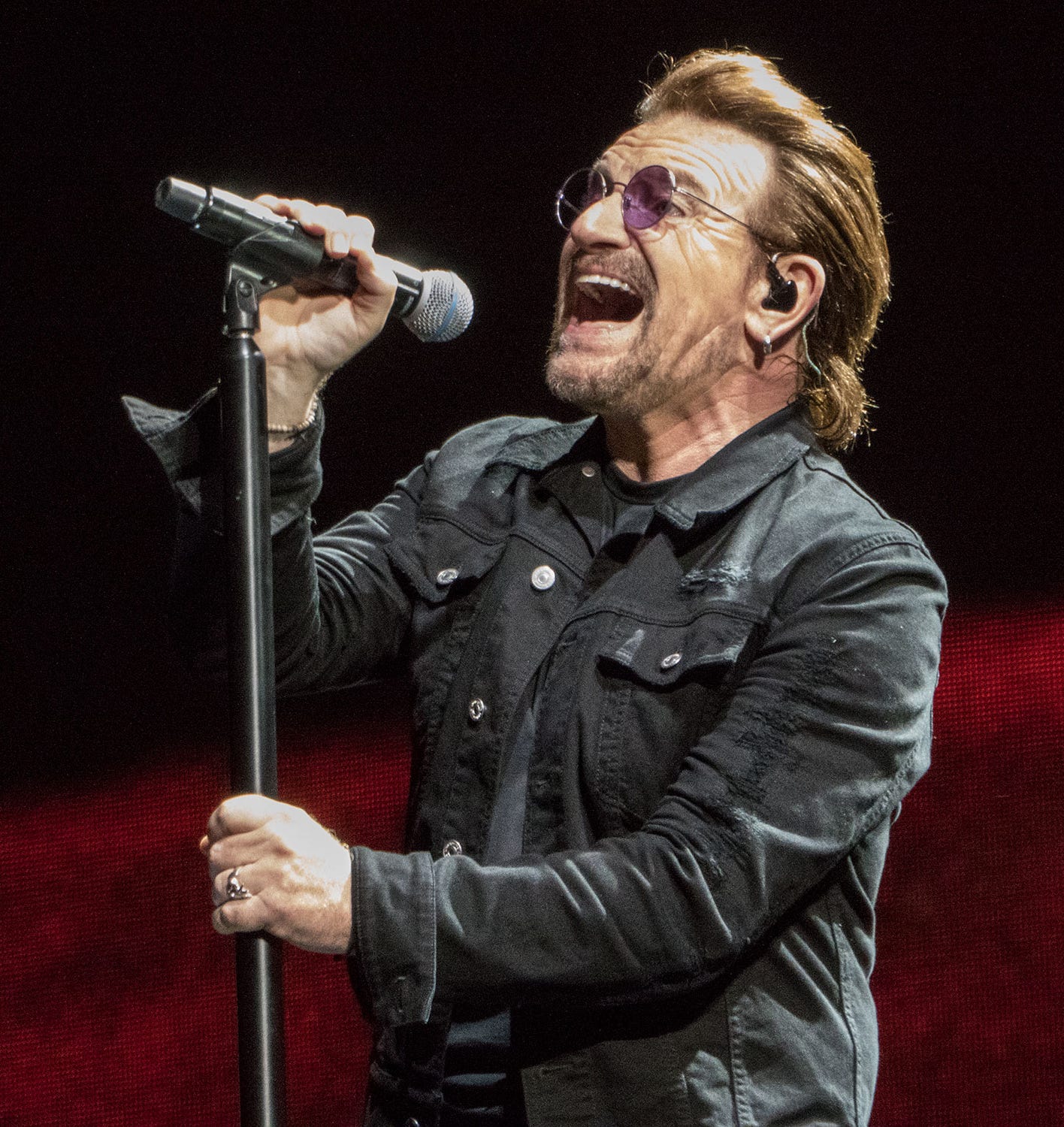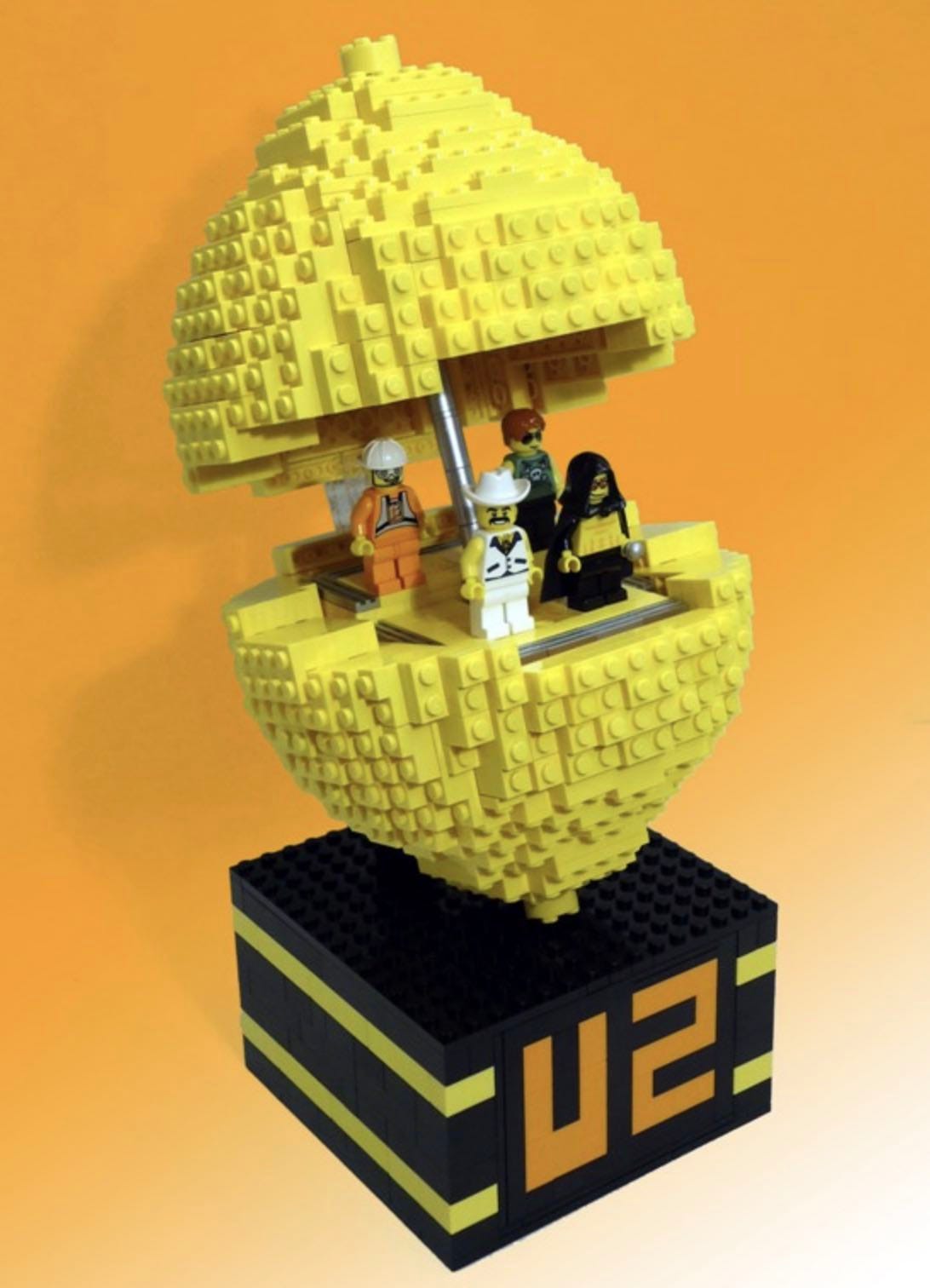
Two hearts beating as one
There are certain bands that we become obsessed with, to the point that they become “our” band. It’s okay for some other people also to love our band, but not too many, and definitely not mainstream folks, aka normies, aka bandwagoners, aka poseurs.
This level of musical infatuation usually occurs when we are young — before we start having careers, families, and mortgages.
When our favorite bands cross over into the mainstream stratosphere, selling millions of albums and performing in sports arenas on their tours, we drop them like a hot potato. Like a hot potato made of hot shit.
U2 was one of these bands for me.
I worked at Wherehouse Records and Tapes (back when those were the only two formats available for purchase) when U2’s 3rd album, War, was released. I was a high school junior, transitioning from hard rock and heavy metal to punk and new wave.
Being late to the scene, it was the band’s third album, War, that turned me into a huge fan of the Irish quartet. I would soon backtrack and become enamored with Boy and October, U2’s first two albums, but War was the one that began my deep obsession.
The band had already developed some international success, with singles such as “I Will Follow” and “Gloria” getting airplay on alternative rock radio and rotation on a new cable channel called MTV.
It was their third release, War, in 1983, that would elevate U2 to the upper echelon of rock royalty, revealing a band at the top of its game.
If their sound seemed preternaturally formed from the beginning, their style and fashion sense clearly took a bit longer to develop. If you look closely at this 1978 photo, you can see the beginnings of the superstars they would soon become.
Bono was years away from wearing oversized sunglasses or appearing in a music documentary, but he clearly knew how to rock a leather jacket. The Edge certainly seemed edgy as a teen (he’s holding some sort of rifle with a don’t mess with me stare). Larry was still two years away from pubic hair and ridding himself of a cute pageboy hairstyle. Only Adam understood the importance of experimenting with style, adding an inverted flower pot on his head (a nod to DEVO?), leopard-patterned pants, and some sort of flying V t-shirt.
I would play the War cassette on the in-house stereo at Wherehouse every chance I got. I couldn’t get sick of it, even though songs like “Sunday Bloody Sunday” and “New Year’s Day” were receiving loads of radio play. I loved those songs, but not as much as today’s earworm, “Two Hearts Beat As One.”
This earworm was self-inflicted. For my monthly “numbers” playlist, I’ve been compiling “two” songs for an upcoming post. I’m only using songs from albums I personally own to help me narrow it down. There are lots of fantastic “two” songs, including “Two Hearts Beat As One.”
I love the way the song starts: Adam Clayton’s nimble, up-front bass line, Larry’s pounding bass drum and snare, and The Edge’s unrelenting guitar riff.
Is it a love song? It’s it about the political situation in Ireland? Is it about trying to maintain joy and connection within the band? When I look it up on SongMeanings.com, all three answers get equal and emphatic arguments.
Like a song
“Like A Song,” the fourth track on War, might be my favorite of the album. Featuring Larry Mullen’s insistent, militaristic percussion, The Edge’s layered, angular guitar lines, and Bono singing as if his life depended on it, it’s one of the best songs in not just U2’s catalog but rock history. The hypnotic pounding energy of the last minute is awe-inspiring. I’ve never seen this performed live, but I can imagine that ending being extended, working the crowd into a frenzy.1
I could list the rest of the album's songs, from “Seconds” to “Drowning Man” to “Surrender” to “40” and everything in between; they hold up as well today as they did 41 years ago. The band would incorporate strings and backing vocals on their later albums, but the way they are integrated on War feels more organic and essential to me.
And Bono’s voice, which would become one of — if not the biggest — reason my love for U2 would fade with the release of their follow-up, The Unforgettable Fire, had yet to morph into overly emotive screeching. Here, he’s singing within his range, and when he pushes it, it feels honest and gritty in all the right ways.
I know a lot of people love The Unforgettable Fire, and I get it — Brian Eno’s production is mostly taking them in new directions, and there are several great songs on the album — but if I never hear “Pride (In the Name of Love)” again, I will be thrilled. The chorus, to me, is like nails on a chalkboard. This song marked the beginning of the end for me.
I may not have been aware of our impending breakup at the time, but with the release of The Joshua Tree in 1987 and the universal acclaim and adoration it received, it became starkly clear that U2 was no longer my band. The raw, tribal intensity that drew me into their orbit for their first three albums and part of The Unforgettable Fire was gone. I had found what I was looking for, but apparently, it wasn’t what U2 was interested in providing anymore.
I always saw this as my issue, not theirs. The band was moving in mysterious ways, exploring new territory with or without me.
If I had officially broken up with U2, I would have sat the four lads down, served them tea and crumpets (or Irish soda and crackers, whatever is culturally appropriate), and said, “Bono, Edge, Larry, Adam—I think we want different things. It’s not you, it’s me. I know that one day you will live out your dreams of touring the world, arriving on stage from inside a 25-foot hydraulic lemon.”
BONO is everywhere
From the mid-1990s to, well, today, if you watched a rock doc on TV or in the movie theater, there was at least a 50 percent chance that Bono would appear to spout his wisdom at some point.
There was a period around 7 or 8 years ago when I was afraid to watch any rock doc for fear that Bono might appear. It’s not that Bono didn’t have anything intelligent to say; it’s just that he kept appearing in films that seemed to have nothing to do with him.
The first time I recall it happening was when I saw Joe Strummer: The Future is Unwritten, directed by Julian Temple, at a film festival in the Bay Area. Other musicians were interviewed, so it wasn’t out of place, but Bono seemed to get about three times the amount of airtime as anyone else.
I didn’t think too much of it, but then he appeared in documentaries about:
Kylie Minogue
Roxy Music
John Lennon
Roy Orbison
Nelson Mandela
and Malala
just to name a few. There are more. So. Many. More.
I just looked up “Bono appears as himself” in IMDB (Internet Movie Data Base), and it lists 346 entries!

It took me almost 35 minutes to scroll to the bottom of his movie credits. Nicolas Cage has nothing on Bono.
Granted, more than 100 of the entries are U2-specific films, but that only narrows it to 225.
My point is if you want to try a new drinking game, rent a bunch of music documentaries and make a rule that you have to chug a beer when Bono appears.
Bono-fied
I’m currently listening to the audiobook of Bono’s memoir, Surrender: 40 Songs, One Story. I’ll admit, I was reluctant to play it, as a little Bono goes a long way.
It’s surprisingly engaging, and Bono’s performative side gives the book a lot more life than I imagine reading it the old-fashioned way might. He’s a wonderful writer, and I really didn’t know much at all about his life growing up in Ireland. Or how he came to meet the three other lads who would become his bandmates and closest friends for the next 45-plus years.
One other benefit of the audiobook is that Bono has recorded solo versions of many classic U2 songs, which are used as chapter dividers. I’ve been enjoying his reinterpretations of the band’s old tunes.
It did make me wonder why he hasn’t recorded a proper solo album. It’s the rare lead singer of a huge rock band that never sets out on his own.
If he does ever release a solo album, I really hope he titles it, Bonofied.
I just double-checked to make sure I hadn’t lied, and Bono had actually released an album. Well, he has. Sort of.
The Complete Solo Works of Bono: Vol. 1 was released in 1997. But it’s a compilation of songs he recorded with other people and duets with Frank Sinatra, Quincy Jones, Keith Richards, and Clannad. So I say it doesn’t count.
I’m working through the Bono book slowly as I did hit my saturation point after about five or six chapters. It had nothing to do Bono’s reading of the book or the songs. He’s done a stellar, professional job.
If Bono reads this and wonders what he could have done to make the listening experience more pleasurable, I’ll say what I said to him and the boys back in 1984.
It’s not you, it’s me.
U2 has been gracing the pages of Substack a fair bit lately, and I thought I’d give a shoutout to a couple of inspiring posts I’ve recently read from and who write the excellent newsletters and .
What are your feelings on U2? I know a lot depends on how old we are and when we got turned on to the band.
I did come to love Achtung Baby, and, to me, it’s their 2nd best album. But outside of that, nothing after The Unforgettable Fire sparked my interest. Sell me on the merits of one of their later albums.
Is it me, or has Bono oversaturated himself in film and media to the point where it’s hard to find the energy to listen to (or watch) him anymore?
thanks for reading!
Steve
From what I’ve learned (via this link on YouTube), U2 only played this song once live. That sounds suspicious to me, but several commenters corroborated it. Kinda nuts if it’s true.










I’ve never had a problem with Bono, so I guess I am pro-Bono. I get why you (and many others) do have Bono-fatigue though.
I’ve never been a full-scale U2 gig, but I was at Live Aid. I’m cooking something for the 40th anniversary next year (I know, along with a million other writers).
Thanks for linking to my ‘Unforgettable Fire’ post, Steve.
This is terrific, Steve! Thanks for the shout out, and thanks for drawing attention to your terrific 'Stack! Looking forward to seeing more of your work!